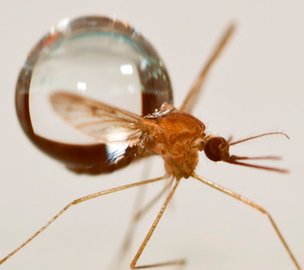
Scientists have found that mosquito’s tiny, low-weight body, is the key to its ability to survive flying in the rain.
A team from the Georgia Institute of Technology filmed the insects as they collided with raindrops.
This showed that their bodies put up so little resistance that, rather than the drop of water stopping in a sudden, catastrophic splash, the mosquito simply combined with the drop and the two continued to fall together.
The team reports their findings in PNAS.

As well as helping explain how the insects thrive in damp, humid environments, the research could ultimately help researchers to design tiny, flying robots that are just as impervious to the elements.
“I hope this will make people think a little bit differently about rain,” said lead researcher David Hu.
“If you’re small, it can be very dangerous. But it seems that these mosquitoes are so small that they’re safe.”
Dr. David Hu is interested in understanding completely the “tricks” that insects use to survive being so small.
After repeated attempts at what he described as the most difficult game of darts ever, he and his colleagues managed to hit flying mosquitoes with drops of water and capture footage of the result.
Each droplet was between two and 50 times the weight of a mosquito, so what they saw surprised them.
Describing the results, Dr. David Hu cited the Chinese martial art of Tai chi.
“There is a philosophy that if you don’t resist the force of your opponent, you won’t feel it,” he explained.
“That’s why they don’t feel the force; they simply join the drop, become one item and travel together.”
When a moving object crashes into another, it is the sudden halt that produces a damage-causing force. For example, when a car hits a wall at 30 mph, the stationary wall and the car have to absorb all of the energy carried by that moving car, causing a great deal of damage.
The trick for a mosquito is that it hardly slows the raindrop down at all, and absorbs very little of its energy.
Surviving the collision though, is not the end of the drama for a tiny insect. It has to escape from its watery cocoon before the droplet smashes the insect into the ground at more than 20 mph.
This is where the insect’s body, which is covered in water-repellent hairs, seems to give it another crucial survival technique.
Every mosquito studied in this experiment managed to separate itself from the water drop before it hit the ground.